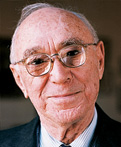Jerome Bruner's seminal book on education celebrated at 50th anniversary event
The commencement of the U.S.-Soviet Space Race in 1957 with the launch of Sputnik gave rise to a second Cold War competition: a race to produce the brightest children and, eventually, the most competitive scientists. The U.S., questioning an educational system that had somehow allowed the USSR to beat it into space, began to examine the teaching of science in schools.
 Even in a culture so focused on achieving a pedagogical advantage, however, the instant success of University Professor Jerome Bruner’s The Process of Education upon its publication in 1960 took the author by surprise. The slim volume of less than 100 pages has sold more than 400,000 copies in 20 languages. (Yet another Cold War irony: the first translation was an unauthorized Russian one.) The book’s stance, controversial for its time, was that “any subject can be taught effectively in some intellectually honest form to any child at any stage of development.”
Even in a culture so focused on achieving a pedagogical advantage, however, the instant success of University Professor Jerome Bruner’s The Process of Education upon its publication in 1960 took the author by surprise. The slim volume of less than 100 pages has sold more than 400,000 copies in 20 languages. (Yet another Cold War irony: the first translation was an unauthorized Russian one.) The book’s stance, controversial for its time, was that “any subject can be taught effectively in some intellectually honest form to any child at any stage of development.”
On April 27, NYU’s Steinhardt School of Culture, Education, and Human Development celebrated the book’s 50th anniversary with an event at the NYU School of Law. Two discussion panels, “Education in the U.S. in the 1960s” and “Education in the U.S. Today,” were preceded by remarks from Mary Brabeck, dean of the Steinhardt School, who called Bruner a key figure in incorporating other disciplines into the study of education: “More than anyone else, Jerry Bruner is responsible for bringing us what many have called a cognitive revolution and has influenced so much theory and empirical research in psychology, but other disciplines also, and certainly in education.”
Before Bruner gave his closing remarks, NYU President John Sexton, former dean of NYU Law, made a surprise appearance to congratulate the honoree. “It’s hard to imagine,” said Sexton, “that we’re celebrating something that happened 50 years ago that continues to have the power that your work does.... You began to change the way we thought about ourselves and the way we think.”
Bruner, a life-long psychologist and current senior research fellow at the Law School, recalled observing that the rats he brought home for his children to play with seemed to become more intelligent than the ones that remained in the lab: “I got to thinking that what my kids did to these rats when I brought them home to make them so smart was kind of a curriculum.”
That realization sparked Bruner’s interest in becoming involved in the post-Sputnik rethinking of education at a time when psychologists had little to do with the field. After heading an interdisciplinary conference of scholars, scientists, and educators seeking superior methods of teaching science, Bruner produced a conference report that was subsequently published as The Process of Education by Harvard University Press. The book, tapping directly into the zeitgeist, quickly took off.
While acknowledging the book’s impact at the time, Bruner, still an active scholar at 95, is more concerned with the effect of broader social issues on children’s learning opportunities.
Citing statistics about low high-school graduation rates and greater frequency of problems with the law among children in poverty, Bruner said, “If I were to write another book tomorrow about education, I would be more concerned with these endemic, principally domestic cultural matters that impose such unspeakable inequalities on our presumably democratic society. It’s a society in which a smaller and smaller proportion of the population each year owns a larger and larger proportion of the wealth. How do you expect a country of this sort to begin to develop a sense of possibility among its population?... We’ve got to stop thinking about education as if it stopped at the schoolhouse door.”
Watch the video of the full event (2 hr, 21 min):

